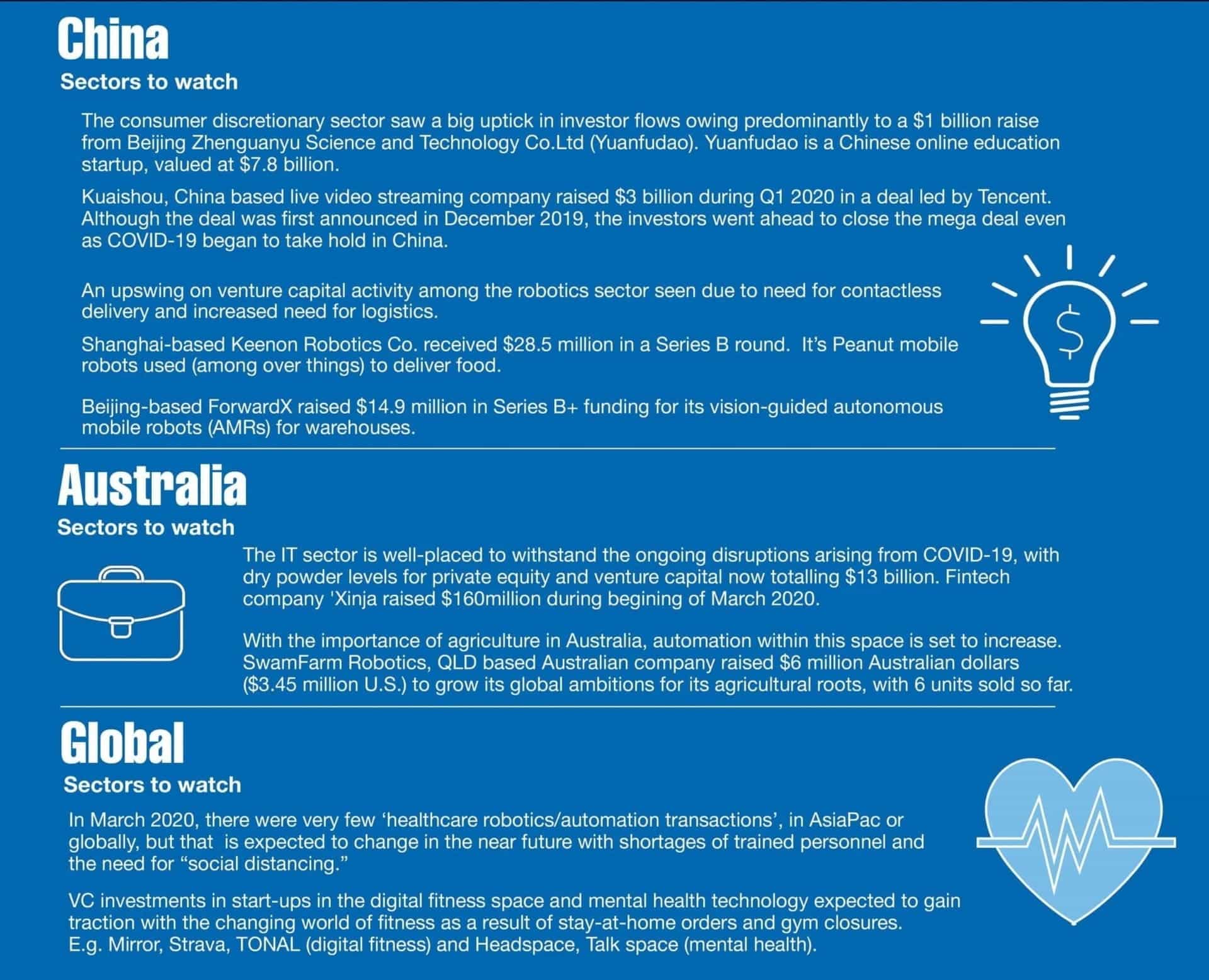As Australia begins to re-open in the wake of COVID-19, there’s much speculation about the economic impact of the pandemic. With $33 billion of assets under management[i], venture capital (VC) and private equity are key contributors to our national economy but what does a post-pandemic world look like through the eyes of a venture capital firm?
Undeniably, the business landscape has changed. Social distancing, partial lock-down and travel restrictions have all resulted in changes to business models. Businesses in ‘solid’ sectors such as education, banking and hospitality are being forced to rapidly change their business models. Meanwhile, new businesses in seemingly marginal sectors such as telehealth and agritech are emerging to provide solutions for our new society.
Australia in a good position
Amidst this change, venture capital funds are cashed up and ready to invest. During 2019, they raised a total of $632 million to invest in Australia. This represents the second highest annual total in the past decade; consequently, analysts cautiously anticipate an increase in activity once the immediate impact of the virus subsides.
Despite a slowdown in China, VC activity in Australia recorded its second highest VC investment, even with a significant drop in deal count in Q1 2020. VC investment in Australia continued to increase over the last four quarters to $429 million in Q1 2020 with digital bank, Xinga, raising the largest amount ($160 million). Just like every other country, the impact of COVID-19 is expected to effect VC results for Q2 2020 which has been witnessed in China who were at the forefront of the pandemic.
Lessons from China
As a nation that has largely come out the other side of the pandemic, we may look to China for indications of venture capital activity.
Even before the outbreak, China suffered from a slow start to 2020 with venture capital deals falling from 340 to 144 and the capital raised falling from $4.3 billion to $1.4 billion in the six weeks from 1 January 2020 to 19 February 2020.[ii]
This fall can be attributed to waning confidence in its domestic start-up scene. The surge of funding activity slumped with investors shaken after poor post-IPO performance from several tech companies. Those that were expected to be a huge stock market success such as the Chinese electric vehicle maker Nio were forced to raise outside capital and has yet to trade above their IPO price in the last year. Similarly, Xiaomi, the Chinese smartphone maker which was touted to be the largest IPO but was listed below its IPO price in July 2018 and has seen its share price decline significantly since listing.
Yet, coming from a low base, it seems that deal making in China is continuing – with 66 venture capital deals recorded in the last week of March 2020 alone.[iii] Overall, private capital transactions in China increased a staggering 150% month-over-month in March.
While it’s still too early to draw any conclusions, China’s quick recovery might imply that the impact of COVID-19 pandemic on venture capital markets can be contained.
The Global Stage
Past outbreaks, such as SARS in 2003 and the 2016 Zika virus, both weighed on public and private investment activity. COVID-19 is no different. While deal flow in the US during first quarter of 2020 has been largely unaffected, we should expect a decline in total venture capital transaction volume over the remainder of 2020 and beyond.
However, if investors are able to find deals, there’s money to fund them. There is ample dry powder in the market ready to be put to work in promising startups. Globally, venture capitalists had around $188.7 billion in dry powder as of mid-year 2019.[iv]
Investors may also find that the market turmoil will bring up new opportunities, and deal terms are back in favour of investors in comparison to a prolonged trend of founder-friendly deal terms. Raising capital in today’s economic environment will be a challenge for startups with investors being much more cautious and looking for protection and liquidation preferences impacting deal terms.
Even today with economic uncertainties, there is an emerging trend in digital fitness and mental health technology. Innovative ‘wellbeing’ companies are highly valued due to their strong growth potential. Digital health services existed pre-COVID-19 and were already poised for solid growth but demand has surged since this crisis.
VC investment in startups focused on digital fitness and mental health technology is expected to gain traction as consumers change the way they manage their health. The trend around ‘holistic’ wellness has been fuelled as a result of self-quarantine and more orders being placed for at home fitness. Given the ongoing shift towards an increasingly mobile lifestyle, these sectors are expected to continue to rise even after gyms and wellbeing centres re-open.
What are the venture capital funds looking for?
The damage of COVID-19 has fundamentally changed the global business community and companies that are currently thriving have shown an ability to adapt to a changing environment, swiftly. Although VCs are not closed for business, there’s a shift in deal-making which may see more emphasis on startup profitability over and above growth. Companies that can demonstrate a deep understanding of the unit economics, profitability and strategies for potential market pivots will be more favoured. A recent survey of venture capital investors[v] also shows that companies with thorough plans for surviving a downturn or those that have already successfully navigated through a crisis will be at an advantage.
Sectors to Watch
Even though deal-making has slowed, a number of VC firms are still seeking out new investments. With many businesses starting to ‘pivot’ we’re seeing more opportunities for those that move quickly to fill a new demand. Consumer investment in digital fitness has increased by 30-35% relative to pre-COVID-19 levels, positioning the sector for faster growth in the future. It’s expected that digital fitness and health will continue to grow and attract investors.

[i] Preqin & Australia Investment Council (AIC) Yearbook 2020
[ii] PitchBook article dated 19 February 2020
[iii] PitchBook article dated 5 April 2020
[iv] PitchBook analyst note on COVID-19’s Influence on the US VC Market
[v] S&P Global Market Intelligence
[vi] S&P Global Market Intelligence
L.E.K Insights: https://www.lek.com/insights/covid-19-accelerating-digital-fitness-boom











